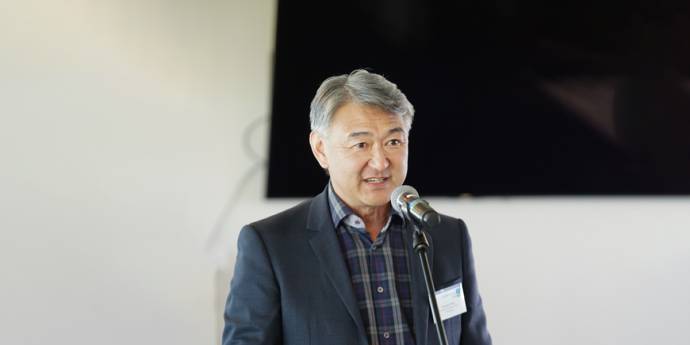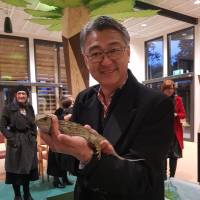Signals ignored: the UK Post Office scandal and the cost of governance silence
A recent webinar on the UK Post Office scandal highlights what boards must do to challenge culture, data and direction.

Sometimes conversations can be transformative, and that’s exactly what it feels like when speaking to Rodney Wong (黃 华 鈴) DistFInstD. The Palmerston North business leader and long-time director establishes an instant rapport with whoever he meets – an asset for a man who has spent more than three decades on public, private, and community sector boards.
More than happy to make time for opportunities should they fall in his lap, one of his favourite sayings is a Chinese proverb by Sun Tzu: “Opportunities multiply as they are seized” and for Wong, this extends to having a chat over a cuppa.
“Anyone can give me a call, it doesn’t matter who it is . . . if I’m available, I’ll sit down and have a coffee with someone,” Wong says.
This December, Wong received the highest governance honour – ‘Distinguished Fellow’ (DistFInstD) – from the Institute of Directors (IoD) for his outstanding contribution to the business and governance community.
Wong has served on organisations including social service agencies, with recent board roles that include Stargate Investments Limited, Vintners Retreat Management (2008) Ltd, Scanpower Limited, and the Rotary Club of Awapuni Charitable Fundraising Trust. He is also chair of the Chinese Poll Tax Heritage Trust and was one of 10 senior trainers for the 1.2 million members of Rotary International.
Professionally, he also has a long and established history in the food industry – he was CEO, owner, and managing director of Yoplait, a company that had three Australian investors “and one of the largest privately owned dairy companies in New Zealand for about six years”.
“We made two unsuccessful bids to buy out Anchor in (2002) just after Fonterra was formed,” he says of being turned down by the Commerce Commission at the time.
As former chair of Crop and Food Research, he led the merger with Hort NZ which formed Plant & Food Research. The move at the time was underpinned by the need for change – to have New Zealand’s brightest minds working on the R&D, rather than spending a third of their time writing applications for research grants which might not be successful. Wong says he instinctively reached out to the other board’s chair, with the purpose to merge two strong organisations.
“You merge when you’re strong, not when you’re weak . . . between the two organisations, we agreed that what we were doing was suboptimal, and that if we didn’t do something, we’d lose capacity and capability,” Wong says.
 But not all of Wong’s roles have made sense, at least, on the outset. Co-founding the Wildbase wildlife recovery centre was far removed from what you’d expect from a man that doesn’t own any pets and describes himself as “not having a green bone in his body”.
But not all of Wong’s roles have made sense, at least, on the outset. Co-founding the Wildbase wildlife recovery centre was far removed from what you’d expect from a man that doesn’t own any pets and describes himself as “not having a green bone in his body”.
“We raised $6 million; designed, built and gifted it to the city,” says Wong, who knew it would add value to the community.
“So, it’s those opportunities that make sense, where you allow other people to have the resources around them to fulfil their dreams,” he says.
For Wong, that ability to make dreams come true derives from ideas and thinking – and conversation – which enables him to connect the dots and, more importantly, to find ‘the points of light’ which require ‘openness’ and where the best solutions can often be found.
“The real points of light are when you sit down with someone and look into their eyes – you see below the surface of what motivates them, the real them,” he says.
Establishing a genuine connection creates opportunities, according to Wong, who admits some frustration with rigid boards whose traditional mindsets get in the way of seeing the possibilities.
“You really wonder why they want to be there if they’re not open, and they premeditate their decisions. By being open, it allows you to do stuff,” he says.
Wong’s entire career has been underpinned by a strong sense of purpose, along with an in-built resilience that simmers quietly beneath the surface. As a Chinese-New Zealander, he is quick to add that he didn’t fit the bill when he entered the dairy industry.
“You had to be short, fat, bald and a farmer’s son with an arrogant attitude to be promoted. I didn't fit a lot of those criteria, so I had to become resilient. You fight the battles you think you can win, and some of the battles that aren’t obvious,” he says.
As a reminder of his purpose, Wong often thinks back to his grandfather, who arrived in New Zealand in the 1920s and paid the Poll Tax – a fee charged only to Chinese immigrants – and his father, who came here as a refugee in 1940. In both instances it was ‘for a better life’ and that sits in the back of Wong’s mind. But driving an idea forward prompts the first question: How will this enhance someone else’s life?
No project goes forward without mulling over the idea or proposition, and Wong reveals there are key elements – or rather, an equation – that runs through his head before moving forward.
“Value equals relevance, multiplied by engagement,” he says of what he calls the ‘Wong formula’.
“I look at value, which could be in terms of monetary value; it could be the social value, or emotional value.”
And it is often that ‘emotional value’ part of the equation that might seal the deal on his commitment to a project, a role, or a cause, even if it doesn’t make sense to anyone else. This makes Wong stand out from the crowd, along with possessing a huge sense of humanity without a desire to want anything in return.
While directors continue to look ahead to what’s coming next – the knowns and the unknowable – Wong isn’t concerned about legacy but hopes that directors and boards are able to dig deep, to ‘feel’ something when they are triggered emotionally and connect with what resides within.
When thinking about potential changes that could be made in boardrooms around the motu, he reflects on his own purpose – the path for a better life – the legacy left by his forebears.
“You don’t leave your mother country without some fear, trepidation, and courage. So we have to have that, as New Zealanders, as individuals, including our boards and directors . . . we can’t hide because it hurts, we have to be open, to dig deep, and allow that to manifest itself,” he says, of what it means to bring about change.
“If you know yourself and you’re open, you have the opportunity to find the points of light and enhance the lives of others.”
Rodney Wong was presented with his Distinguished Fellow award on 10 December in Palmerston North.